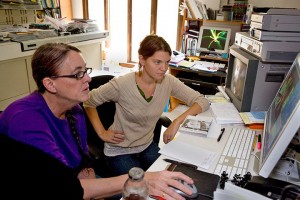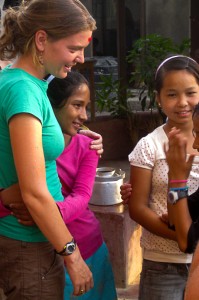Tag Archives: making a difference
The day had an ominous look to it, with a dark foreboding sky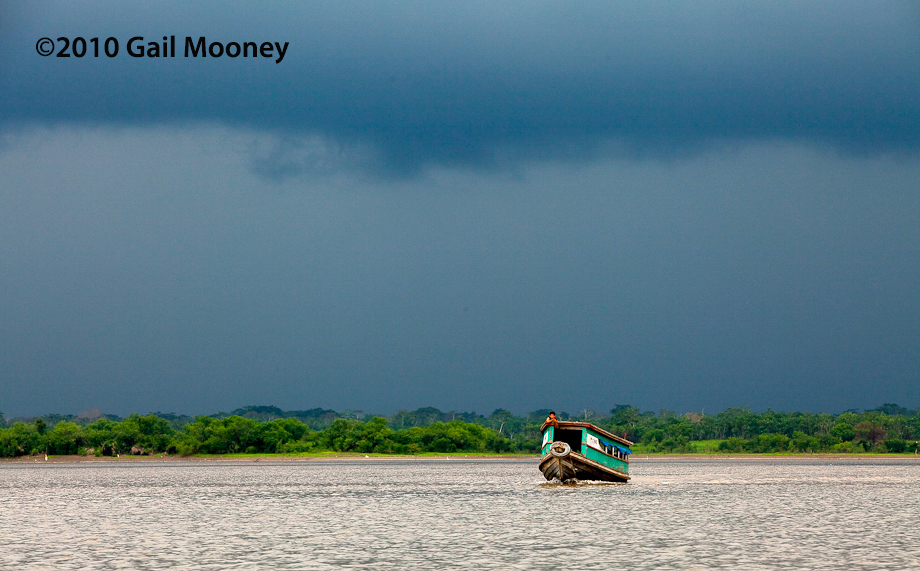 and choppy water on the great Amazon River. Erin and I were staying at the APECA base camp upriver from the town of Belen, one of the poorest towns along the river. We were planning to go there that day, by boat – everything is done by boat – there are no roads.
and choppy water on the great Amazon River. Erin and I were staying at the APECA base camp upriver from the town of Belen, one of the poorest towns along the river. We were planning to go there that day, by boat – everything is done by boat – there are no roads.
Pablo, Gina Low’s partner at APECA, assessed the situation and decided to go as planned, but he told us it was going to rain and to prepare for it. The trip to Belen took about an hour if my memory serves me well. It was open water with just a few villages along the way and aside from the sound of our motor and those of other boats off in the distance; there was an eerie silence.
When we got to Belen, the skies let loose. Pablo quickly navigated our boat to one of the shacks along the river. We took refuge in this machine shop and watched the storm play out. We were thankful for the cover over our heads and grateful to Pablo for knowing exactly what to do. I think that is what continually impressed me the most about the people in our film, like Pablo. They were all incredibly independent and resilient in difficult situations. They were people you could trust and that says a lot.
Some of our fondest memories from our journey were from our visit with Maggie Doyne and her children in Surkhet, Nepal. All the kids were such a joy to be around. 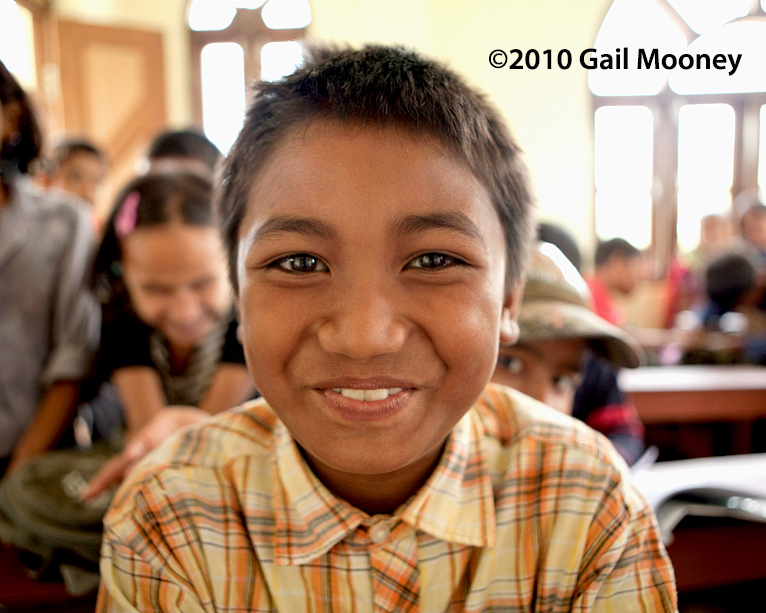 This young boy at the Kopila Valley Primary School glowed with enthusiasm.
This young boy at the Kopila Valley Primary School glowed with enthusiasm.
This photograph was taken when my daughter Erin and I were filming in a
was taken when my daughter Erin and I were filming in a
small hill tribe village in the northern mountains of Thailand. We were following Dr. David Mar Naw, as he trekked through the villages, a “one man band”, dispensing medical care and building latrines for Burmese refugees. Some of them had never seen a doctor before. This lady was waiting to have her tooth pulled.
It was painful to watch as the doctor pulled this woman’s tooth, without anything to ease her pain. She was stoic and barely winced. Perhaps she was thinking about the relief she would have, after the tooth was removed.
These people humbled me, in fact I was humbled by all the people we met, along our journey around the world. I will be forever grateful for that journey. It opened my eyes to so many things and I am a better person because of it.
This is just one story that makes up the film, Opening Our Eyes, a documentary about the “power of one” and “making a difference” in the the world.
Tom and I will be headed out tomorrow morning at the crack of dawn. We’re bound for Chicago to spend Thanksgiving with our daughter Erin, her boyfriend Bryan and his family. For me, it’s also a welcome road trip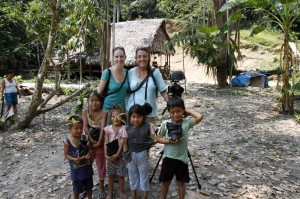 and a journey home to my birthplace. It’s funny how things have a way of coming full circle. I was born in Chicago and left to head “East” with my parents and family when I was a young child. But for someone like me, who has moved more than a dozen times in my lifetime – Chicago feels like home. It’s where my roots are.
and a journey home to my birthplace. It’s funny how things have a way of coming full circle. I was born in Chicago and left to head “East” with my parents and family when I was a young child. But for someone like me, who has moved more than a dozen times in my lifetime – Chicago feels like home. It’s where my roots are.
I’ve been a bit of a “rolling stone” over the years, but I’m also extremely grateful that I have been able to share many of life’s incredible experiences and travels with Erin and my husband Tom. It’s been a gift, to be able to combine my passions with my career and family. This Thanksgiving I am mindful of my blessings and am most grateful for what I have.
One of the things I am most proud of is the creation of the film, Opening Our Eyes, that I made in collaboration with my daughter. The journey in and of itself was rewarding, but I have found that sharing it has not only inspired and motivated others to create positive change, it has also enriched my own life.
If you would like to see the film or share it with others over the holidays, we are now offering it online. We are also offering a Thanksgiving special.
Click here and use the coupon code “THANKSGIVING2013”.
The journey is over and the memories have begun to fade. But the legacy lives on in the film my daughter and I created, when we set out some 3 years ago seeking individuals who were making our world a better place. And indeed, we found many people – ordinary people who were doing extraordinary things. And every one of these people had one thing in common – they had found their purpose in helping others. 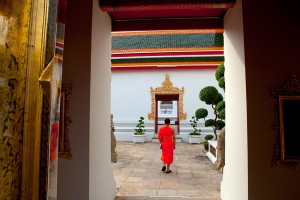 The more they gave – the more they got back in return. But none of them “gave” with the idea of getting something in return. It wasn’t about getting money, favors, recognition, or other ego related pursuits, it was about caring for their “fellow man”.
The more they gave – the more they got back in return. But none of them “gave” with the idea of getting something in return. It wasn’t about getting money, favors, recognition, or other ego related pursuits, it was about caring for their “fellow man”.
I think that the biggest reward for me in making this film, was sharing that experience with my daughter. She was fortunate to have been born and raised in a beautiful and privileged part of the world and I wanted her to have a greater global perspective. It’s almost impossible to “care” for your “fellow man” when if you don’t have an understanding of who they really are. We all hear about conflict and our “differences” that seem to keep our world divided, but for many of us it’s too distant and outside our consciousness and the confines of our own daily reality.
The truth is the world seems like it’s gotten a whole lot smaller since I was my daughter’s age. It’s amazing how technology has connected us all. What’s even more amazing is the “reach” each one of us has. It’s not very difficult for “one person” to get their message out these days – globally – and instantaneously. Think of the power in that. I realized that first hand with this film and how it has connected people all over the world. I am grateful that I live in an age, when I am able to use my craft, to spread the message about the power each one of us has in making a positive difference in our world – the “power of one”.
But it starts with each one of us, in our own communities and with the people we have relationships with. We can all be a little more thoughtful of how we treat the people we know – that is if we can get outside our own egos. It may be as simple as stopping ourselves before we say something, or do something that could affect someone negatively and ask, “how would I feel if I was on the receiving end?” It’s the little things that we all do and say, that can affect someone, either positively or negatively and that in turn goes on to affect more people and it starts to ripple through “community” and beyond.
I think we all need a reminder from time to time that it serves no purpose to dismiss or treat anyone with disregard, anger or contempt. It only serves to make us bitter inside. I have learned that lesson more than once in my life. The older I get, the more I realize that I’d rather harbor thoughts of love, kindness and forgiveness than hold onto negative ones. Ultimately, life’s too short to focus on the negative.
We each have our own perspective and we each get to choose the lens we see “life” through. I choose a lens of love, respect and caring. I haven’t always chosen that lens and no doubt there will be times in my life, going forward, when I will falter and start seeing life through the wrong lens. Please, let me know when I do.
For those of you who have been asking when Opening Our Eyes will be available – it has been released on DVD and VOD.
In some ways we have never been more connected than we are right now – at this juncture in the timeline of mankind. In other ways we have never been more disconnected and detached. When I embarked on a 99 journey around the world almost 3 years ago to date, I suppose in some ways I was looking to get more connected with what was happening globally, in a real sense. These days, it’s too easy to fall into a cyber world, where most of our connections are intangible. Call me old fashioned, but I feel the need to connect with people in real terms. When I returned from my journey, I had not only connected with people from all around the world, I had connected with myself and what part I was meant to play in the timeline of life.
As the years have ticked away, I have tried to remain true to myself, especially in how I apply that to my craft and my career. This past weekend I had an assignment for Kiwanis Magazine. The assignment was to photograph volunteers from the local 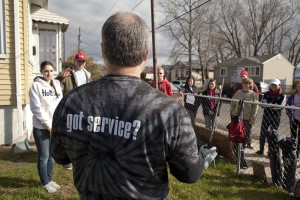 Kiwanis and Ki Clubs, repairing a home at the NJ shore that had been damaged by Hurricane Sandy. I had not been down to the shore since Sandy, but I knew this area had been the hardest hit in the state. While much of the debris has been taken away, there’s an empty and desolate presence especially in the poorer towns that had no money to rebuild.
Kiwanis and Ki Clubs, repairing a home at the NJ shore that had been damaged by Hurricane Sandy. I had not been down to the shore since Sandy, but I knew this area had been the hardest hit in the state. While much of the debris has been taken away, there’s an empty and desolate presence especially in the poorer towns that had no money to rebuild.
The task on hand for the volunteers that day, and there had to be about 30 people who showed up, was to install new sheet rock and insulation, put in a new bathroom and do general clean up of the property. It was a modest home in a very modest neighborhood of houses that had been salvaged amongst the ones abandoned. The first thing that hit me was in fact – this is someone’s home. 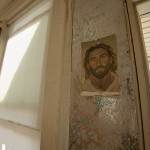 As much as I was there to photograph the volunteers, my eye was drawn to the personal effects of the owners, pushed up into the corners of damaged rooms along with their Easter decorations in rooms they were living in. Life must go on.
As much as I was there to photograph the volunteers, my eye was drawn to the personal effects of the owners, pushed up into the corners of damaged rooms along with their Easter decorations in rooms they were living in. Life must go on.
The day was filled with positive energy. Kids were painting, raking, cleaning storm drains while older tradesmen were working with other volunteers and teaching them their craft. And at the end of the day, everyone walked away tired, but feeling really good about the contribution they had made. I’m sure some of these kids had to do some kind of community service as part of their school mandates, but could I tell that every one of them got a lot more out of the experience than just school credits. I know I got a lot more out of it than a paycheck and some photographs in a magazine.
After the chores had been done and I had gotten the photographs that I needed, I took a drive with my husband along the ocean road. It was a new landscape, changed by a hurricane that hit hard. But I felt hopeful and humbled once again about the power that’s in all of us to make a difference.
I’ve been to dozens of screenings over the past year, at film festivals, schools and community gatherings around the country and everyone always asks the same thing: “What can I do? How can I get involved?”  And that’s exactly what Erin and I hoped for when we created the film, that people would be inspired and moved to take action.
And that’s exactly what Erin and I hoped for when we created the film, that people would be inspired and moved to take action.
So, we have changed the Opening Our Eyes website so that we can help answer that question instead of being a dead end. I wanted the film to be a jumping off point for people to take action, but that would only happen if we could direct that energy into tangible ways.
We’ve set up a “take action” page, with three different sections on ways that you can help make a positive difference in your community or on a more global scale. You can “become the power of one” and find out how Maggie Doyne used her babysitting earnings to make a difference or find explore volunteer travel opportunities. You can “multiply the power of one” and donate to our subjects’ causes or find out about volunteering for them or you can host a screening of the film and “showcase the power of one.”
Every time I start to step away from this project, something happens to pull me back into it. So I suppose that this journey isn’t over. I continue to be amazed by the collective power we all have in making change happen and making our world the world we want to live in. I still remember what one of our subjects, Robbin Moulds told us one rainy day in Sydney, Australia. She said, “At 211 degrees water is hot. At 212 degrees it boils. That’s a one degree difference.”
I challenge you all – what’s a one degree difference you can make?
The best part about creating the documentary, Opening Our Eyes, was getting to be around some of the most amazing, inspirational people I’ve ever met in my life. So many things that these folks said during their interviews, still run through my mind on a daily basis.
One thing in particular was something that Maggie Doyne said when she was talking about what she built in Nepal “It’s not perfect. If I had waited for things to be perfect, none of this would have happened.”
I work and live with a perfectionist, my husband and my business partner. We are opposites in every way. I am one to take my “big idea” and jump right into it. I’m also one who wants to complete something and follow through right away, regardless if it’s “perfect” or not. For example: I could have/should have gotten this film professionally color graded before I sent it out to festivals and distributors. But, I didn’t have the funds to do that, so rather than let the film “get old” until I could get more funding (which may not have happened), I pushed it out to the universe, and good things have happened.
It’s good to be detail oriented and to strive for perfection, but not if you use it to give yourself reasons to stop yourself from moving forward. Many times, when I tell my husband my latest “big idea”, his first instincts are to tell me dozens of reasons I shouldn’t act on it until……………everything is perfect. His intentions are good – he wants to protect me from failure, but if I let it, his words might also end up protecting me from success.
We both recognize our differences now as our individual strengths and that when we listen, learn and balance those opinions and differences so that they can work together instead of opposed to each other, great things can happen. But that takes practice and also not having to be right all the time. There is no one “right” and that’s the beauty of collaboration and working in harmony.
“This could be one of those rare moments in life when you can go back in your past and make things right for your future.”
I was in NYC last night and I saw this sign in a shop window. It wasn’t a big sign, but nevertheless it caught my eye and stopped 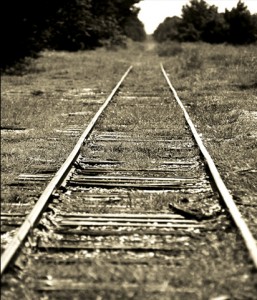 me in my tracks. It was the second time this week that I had seen that very same phrase written. How odd and what an uncanny coincidence to see these same words written in two totally random places, in the same week. I thought, “if only it were true”.
me in my tracks. It was the second time this week that I had seen that very same phrase written. How odd and what an uncanny coincidence to see these same words written in two totally random places, in the same week. I thought, “if only it were true”.
It’s not possible to change the past of course, but I started thinking about it and what I would change, if I could. There were lots of things that came to mind immediately, that in hindsight I might have done differently. But when I really started thinking of things that I’ve done in the past, in terms of what I would change to “make things right for my future”, there were only a couple of changes I would make.
The fact is that even the things that I wish I could change the most, probably had to happen for one reason or another in order to have a brighter future. We can’t change the past, but we can learn from it.
One thing I love about the New Year is that it gives me a feeling of renewed hope and that we all have a fresh start to “get it right” in the coming year. I’m not one to make grandiose resolutions because they leave me feeling like a big loser weeks later if or when I falter. I’d rather simply focus on each new day and be the best I can be.
I am not perfect and I never will be. I am a work in progress and each day, week, month and year I strive to be true to who I am and not let others deter me from my purpose. I will try to remember that no one can really change the past but we can let go of it. But “letting go” is not trying to erase the past. Attempting to do that really only harbors negative energy inside. The very act of trying to repress or block something from your past is in fact the opposite of “letting go”. To really “let go” is to be able to forgive yourself (or others) from past mistakes, and move forward in a positive way. I try to embrace each new day, and give it and everyone I know the opportunity to “make things right for the future”. I can only hope that others will do the same. Imagine the power in that thought.
Be kind, be loving, and focus on the best in others – not the worst, because isn’t that what you’d like others to do for you? When you start to live life this way, you’ll probably never even have the desire to want to go back and change your past.
Once again, I try to make sense of another senseless act of violence – this time one that snuffed out the lives of 20 innocent children. Every time there is another tragedy caused by guns, we question our firearms laws and vow to do something about the “problem”. The usual discussion takes place with lots of talk on both sides of the issue and then dissipates – until the next tragedy.
I think the “problem” goes beyond the discussion of a “right to bear arms”. I think it speaks to a greater problem and that is how we deal with our fellow man.
Too often we judge others without knowing much about their circumstances. Too often we seek to be understood but don’t place importance on seeking to understand someone else. I think this happens when we become too insular – when we don’t allow ourselves to become in tune to the rest of the world or even our own communities.
Some simple thoughts on how we can become more compassionate:
- Seek to understand – not just to be understood. I wish I had a dollar every time someone said to me “my point is…….” – I would be rich. Every time you are tempted to make “your” point – also make an attempt to understand someone else’s.
- Learn to forgive – Human beings are far from perfect. They do things and say things they usually wish they hadn’t. When we forgive others for the hurt they’ve done to us, we free ourselves from the pain as well. When we don’t forgive, we keep the negativity inside. It ends up consuming us. Try forgiveness instead.
- Don’t judge others – There’s an old saying “people who live in glass houses, shouldn’t throw rocks”. Don’t judge others unless you want to be judged by them.
- Don’t bully – There are many ways people bully – it’s not always overt. Bullying really means forcing your way on someone else. When you ignore someone, you are being just as much of a bully as someone who is more aggressive. Essentially, you are no different in how you go about “getting your way”.
- Treat people how you would like to be treated. Stop and think before you speak and act. Would you like to be treated that way. I’ve never liked cliques for this reason. There’s always an exclusionary aspect to a clique. There’s always judgments being made about who should and shouldn’t belong.
- Do things for someone without the expectation of return. The rewards of giving are just that – the act of giving itself is the biggest reward you give yourself. When you do something and expect something in return and it doesn’t happen – it takes away the joy of giving.
- How many times have you told yourself that you will be more caring and giving? And how many times do you let that thought slip into oblivion without acting on it. Next time you say that – follow through.
- Every simple act of kindness adds up. Imagine if we all did something kind for someone every day. Just imagine.
- Look past the someone’s exterior. It’s hard sometimes to look past the actions of someone. We end up questioning and taking things personally when in fact many times someone’s actions have nothing to do with us
- Live a compassionate life and teach your children through your actions what that means. It starts there. Showing compassion is one of the best ways to make our world a better place. You will set an example for your children and they will pass that along to future generations.
What are other ways we can be compassionate?
“Compassion and happiness are not a sign of weakness but a sign of strength.” ~Dalai Lama
